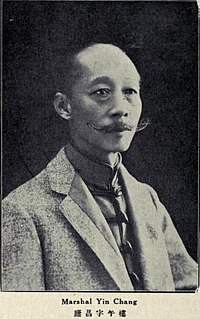
Yinchang (Who's Who in China 3rd ed., 1925)
Yinchang or Yin-ch'ang (traditional Chinese: 廕昌; simplified Chinese: 荫昌; pinyin: Yìnchāng) (1859[1] - 1928) was a military personnel and politician in the Qing Dynasty and the Republic of China. He was the Minister of War in the late Qing Dynasty. Later he also became the Chief of the General Staff in the Beiyang Government. He was ethnic Manchu, and his family belonged to the Plain White Banner Division of the Manchu Military Organization (滿洲正白旗).
Biography[]
In the Qing Dynasty[]
In the beginning Yinchang was a student of Guozijian. In 1872 he learned the German language at the Tongwen Guan, Beijing. In 1877 he was sent to Germany as a third-class of secretary-translator of the Chinese Legation at Berlin. During his stay in Germany he studied military science and subsequently married a German wife. In 1884 he returned to China, on same December he was appointed a translator for the Germany military officer who posted to the Qing Dynasty.[2][3][4]
In June 1885 Yinchang was appointed a translator of the Tianjin Military Academy, later he was promoted to the manager of this school. The late President of the Republic of China Feng Guozhang was a student under his direction. In winter 1899, he took charge of the negotiation about railways and mines in Shandong with Germany, and signed the constitution for railways and mines in Shandong (山東路礦章程). In 1901 he became a Deputy Lieutenant-General commanding the Plain White Banner Garrison (正白旗漢軍副都統).[2][3][4]
In 1901 Yinchang accompanied Zaifeng, Prince Chun to Germany with the special mission to convey China's regret about the Boxer Rebellion. In same July he was appointed the Chinese Minister to Germany (Berlin) and therefore didn't return to China with the Prince. On next month he also held the Chinese Minister to Netherlands. In 1905 he was recalled and returned to China. At the end of the year he was appointed the director of the Nobles' College (貴冑學堂總辦). In September 1906 he became Commander-in-Chief in Jiangbei (江北提督), and two months later, was (right) vice-president of the Army Board (陸軍部右侍郎). In September 1908 he was reappointed to the Chinese Minister to Germany (he duly went to post in Spring 1909). In March 1910 he was recalled and returned to China for appointing to the acting President of the Board of War (陸軍部尚書).[2][5][6]
In the Xinhai Revolution and the Beiyang Government[]
In September[7] 1910 Yinchang became Inspector-General of all the Army divisions stationed the vicinity of Beijing (訓練近畿陸軍各鎮大臣). Three Months later, he was given the Portfolio of War. In May 1911 Yikuang, Prince Qing established his Cabinet, Yinchang stayed in office. On the outbreak of the Xinhai Revolution in same October, Yinchang tried to quell the revolutionary army in Hubei, but he couldn't command the army of Qing Dynasty which was influenced by Yuan Shikai. In next month Yinchang resigned from his post, while Yuan established his Cabinet.[2][5][8]
After the establishment of the Republic of China, Yinchang was invited to the High Diplomatic Advisor of the Ministry of Foreign Affairs. In December 1912 he was made a Full General and was appointed to the head of a military burearu to the President's Office (總統府軍事處處長). In May 1914 he was appointed to Chief Military Aide-de-Camp to the President by Yuan Shikai. In December 1917 he became Chief of the General Staff. In January 1919 he was reappointed to Chief Military Aide-de-Camp to the President by Xu Shichang. In October 1923 he was received the title of Marshal with "Zhuang Wei" (莊威將軍). He died at Beijing in 1928.[2][5][8]
References[]
- ↑ According to Xu(main ed.) (2007), p.2209. Who's Who in China 3rd ed. (1925), p.938. wrote "1860".
- ↑ 2.0 2.1 2.2 2.3 2.4 Xu (main ed.) (2007), p.2209.
- ↑ 3.0 3.1 Who's Who in China 3rd ed. (1925), p.938.
- ↑ 4.0 4.1 Gaimusyô Zyôhôbu (1928), p.4.
- ↑ 5.0 5.1 5.2 Who's Who in China 3rd ed. (1925), p.939.
- ↑ Gaimusyô Zyôhôbu (1928), pp.4-5.
- ↑ According to Xu(main ed.) (2007), p.2209. Who's Who in China 3rd ed. (1925), p.938. wrote "August".
- ↑ 8.0 8.1 Gaimusyô Zyôhôbu (1928), p.5.
Footnotes[]
- Xu Youchun (徐友春) (main ed.) (2007). Unabridged Biographical Dictionary of the Republic, Revised and Enlarged Version (民国人物大辞典 增订版). Hebei People's Press (Hebei Renmin Chubanshe; 河北人民出版社). ISBN 978-7-202-03014-1.
- Gaimusyô Zyôhôbu [Intelligence Department of Ministry for Foreign Affairs, Japan] (1928). Gendai Sinazin Meikan Kaitei [The Directory of Current Chinese, revised edition]. Tôa Dôbunkai Tyôsa Hensyûbu [Researching and Compilation Department of Toua Doubunkai].
- Who's Who in China 3rd ed. The China Weekly Review (Shanghai), 1925.
The original article can be found at Yinchang and the edit history here.